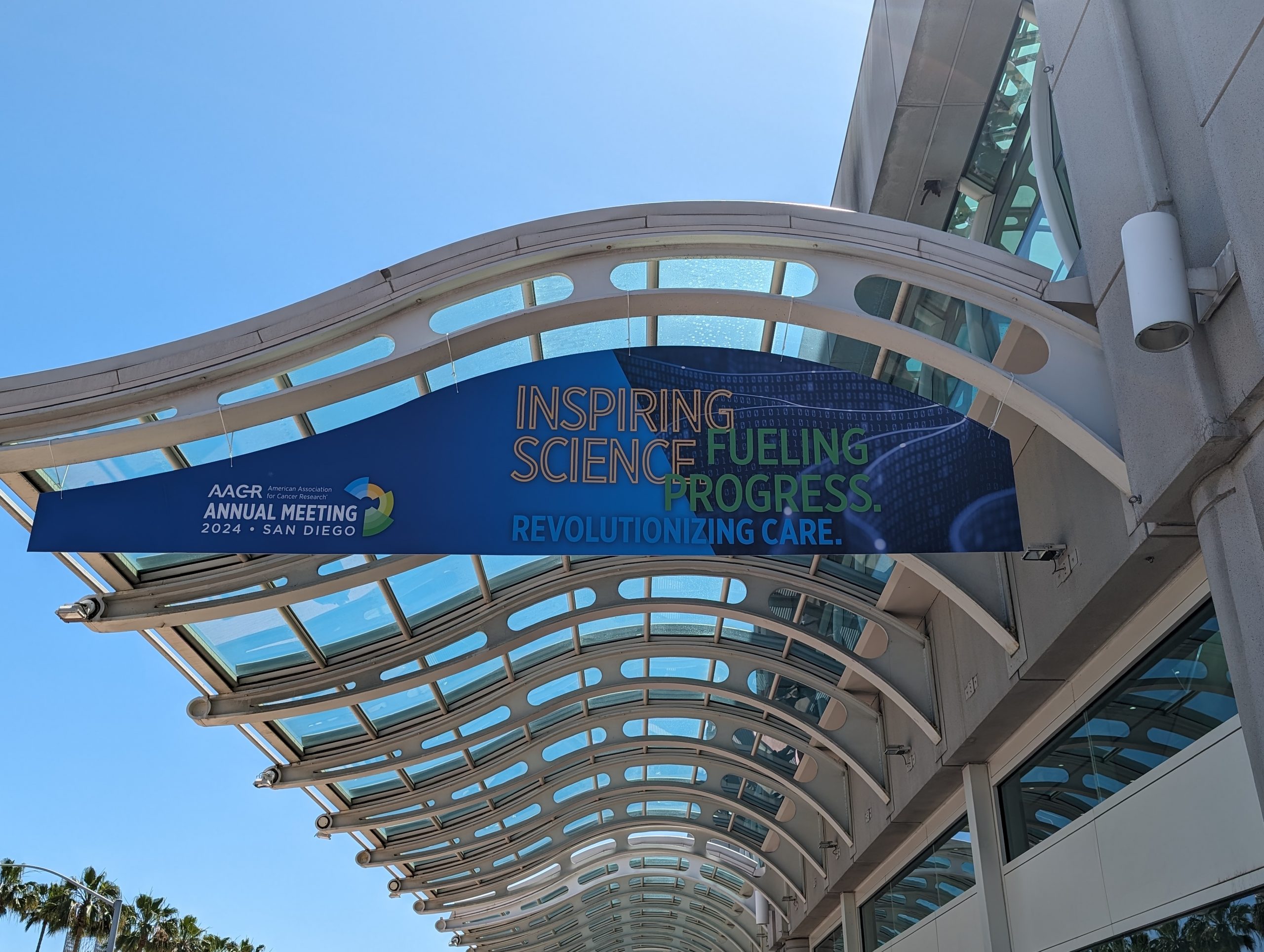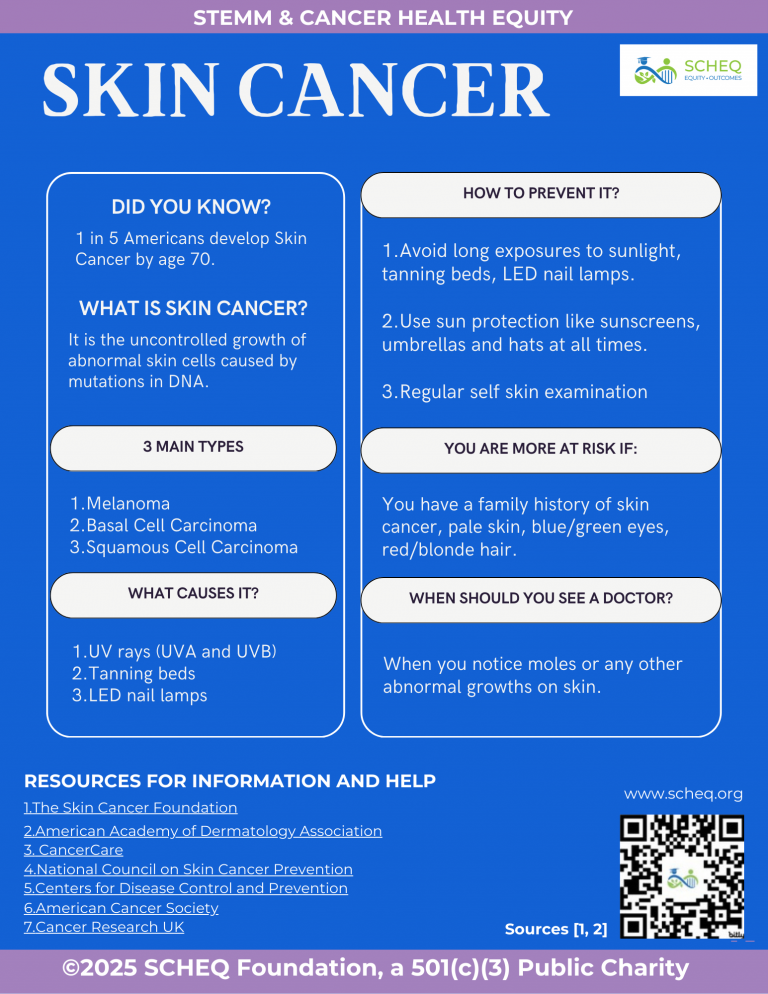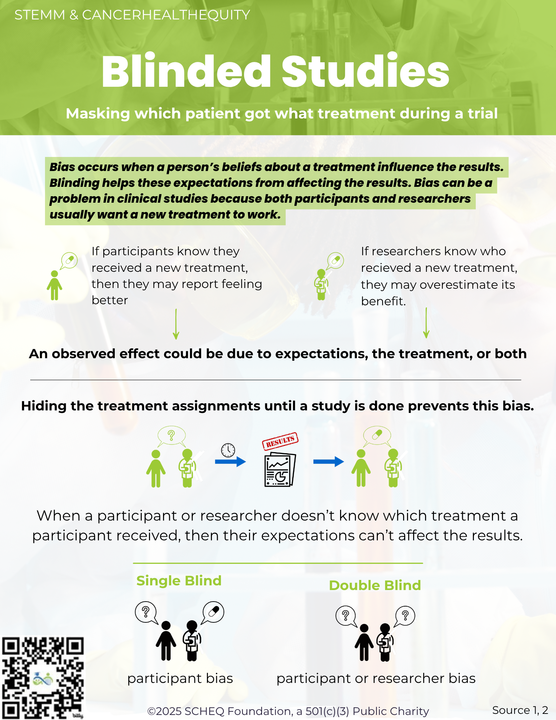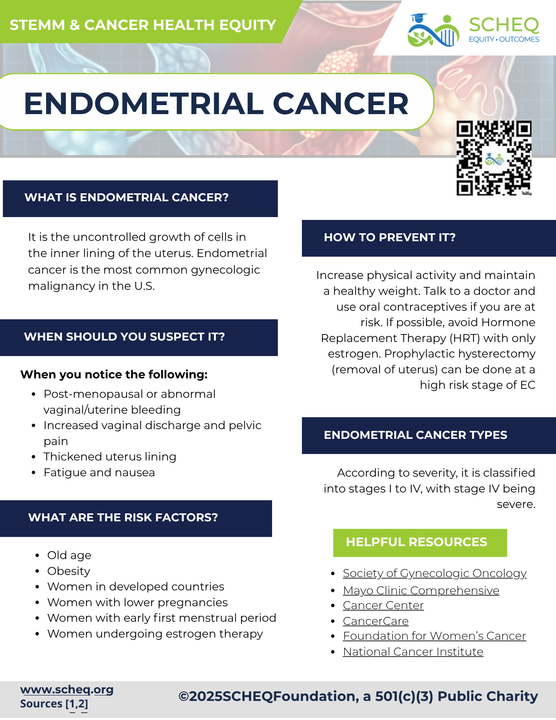This year the American Association for Cancer Research (AACR) Annual Meeting was held Apr 5-12, 2024 at the San Diego Convention Center in San Diego, CA. Attendance is approaching pre-pandemic levels again as 22,500 people attended. The theme was “Inspiring Science – Fueling Progress – Revolutionizing Care”. As usual, you needed to plan out your schedule in advance as the exhibit space and conference space was massive. One also needed good walking shoes, as the steps kept coming and coming and coming. That being said, the recap will highlight 4 areas of the meeting.
AACR Oncology Industry Partnering Event
The inaugural rendition of this event occurred on April 4-5, before the kickoff of the AACR Annual meeting and was called AACR Oncology Industry Partnering Event: From Cancer Discoveries to Patients. This program was intended to bring pharma, biotech, investors, and other stakeholders together to foster deals and collaborations.
What I liked from a researcher lens:
- The major companies highlighted their portfolios and areas of innovation.
- I had some great discussions with the individuals, organizations, and nonprofits that met with me. Most of my discussions happened at the tables outside of the presentation room as there was more space to meet people.
- The staff was exceptional as they worked around my anaphylactic allergies. They prepared separate plates for me to ensure that I minimized exposure to aromatic triggers. They went above and beyond.
Wearing my patient advocate hat, I would have to say patients and patient advocacy organizations should be more acknowledged in the program:
- Even though patients were included in the title of the event, it felt as if patients were still not a priority. At one point It was stated that there were 4 key players at the event including research, pharma, and investors to drive deals. However, patient was not mentioned at all as a stakeholder. If patients are not a key stakeholder, how and why are deals being made that impact them? If we keep minimizing patients, we will continue to have lack of cell line diversity, lack of clinical trial diversity, lack of trust, and lack of research and workforce diversity.
- Whether intentional or not, some organizations did not respond to emails or made it clear that they had no interest in partnering or having discussions. It is not a good look when patient organizations also paid to be present. Some of these nonprofits are new, are growing, are established, and/or are running on shoestring budgets. It is hard to rationalize to newer nonprofits that they should attend if they are not going to get a return on investment. It is unclear if maybe only certain types of nonprofits should attend, i.e. those funding research, doing research, or running a venture philanthropy arm.
First SCHEQ Poster
We presented our first poster on the SCHEQ Foundation at the Annual Meeting on Monday April 8, 9 AM -12:30 PM (PT). It was a great opportunity to let everyone know why we were formed, what we are doing, and how we plan to implement systems change to overcome or mitigate systemic and structural barriers. We will provide information and resources to increase STEMM access and exposure for diverse individuals at early ages to spark an interest in STEMM; develop mentorship, training, professional development, and workshops to increase preparedness and success in STEMM careers of historically excluded populations; and increase health literacy and health equity for underserved groups navigating cancer through the development of comprehensive resources to empower patients. About 20 people, including several nonprofit organizations and pharma visited our poster. We may have had more traffic, but the eclipse happened during the back end of our poster session. Feel free to reach out if you want to discuss partnerships, our supportive services, STEMM, or patient advocacy.
Patients and Patient Advocacy
There were several touch points that impacted advocacy and patient organizations.
- The Scientist to Survivor (SSP) Program is a great program that allows patients to meet with researchers, clinicians, and regulatory individuals to learn more about research, regulatory, and how to become a better patient advocate.
- There were numerous poster presentations by patients and patient advocacy organizations across the cancer spectrum. Those in the SSP also had their own poster sessions and some were speakers on panel discussions.
- Some patients spoke at the Trust in Science session which revolved around community engagement, listening, and building trust and trustworthiness.
- Patient advocacy organizations also had a small area in the exhibit hall where they could display materials. I think roughly 15 – 25 organizations were represented. It was great to go through and chat with the various organizations to learn about the programs and initiatives.
Meetings and BU Alumni Reunion
I have not been to an AACR meeting in quite a few years. It was great to run into many teams and groups that I routinely have interacted with over the last few years. I saw the FANS team from UCSF, the Hematology/Oncology Team at the University of Illinois Cancer Center, IARC, Fox Chase Cancer Center, the Minorities in Cancer Research (MICR) groups, and University College London to name a few. Unexpectedly, there was also an impromptu Boston University Molecular Biology, Cell Biology, & Biochemistry (MCBB) PhD Program reunion. It was great to see the things that my friends have accomplished since we completed our degrees. I have not seen some of them in at least 10+ years.
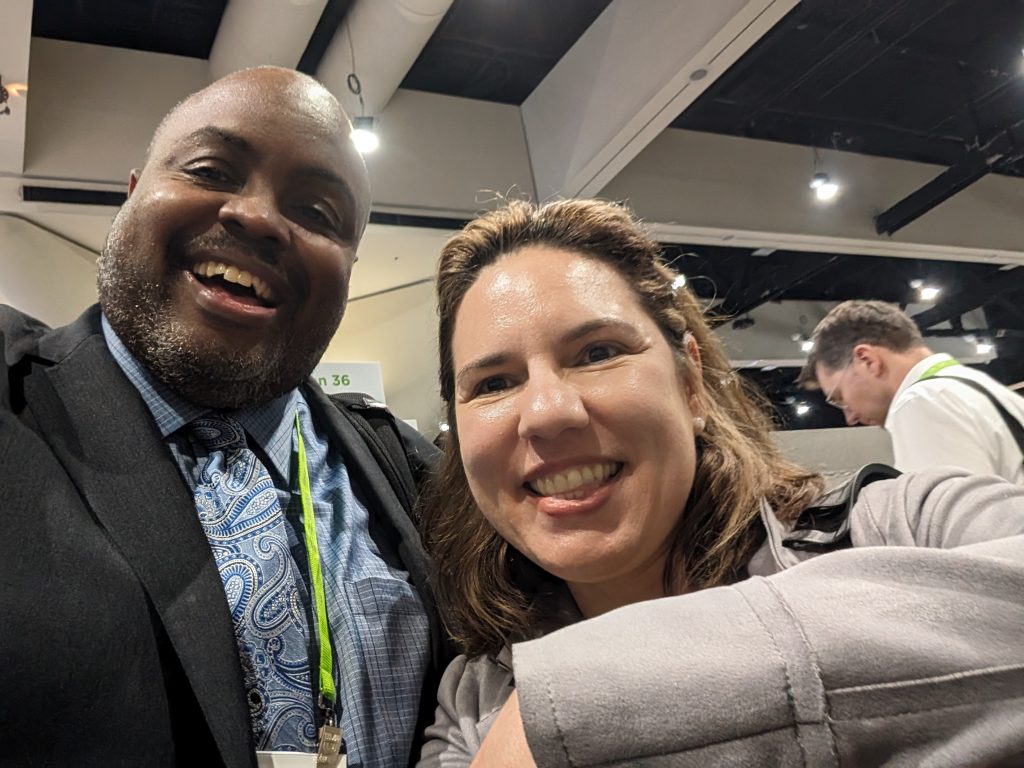
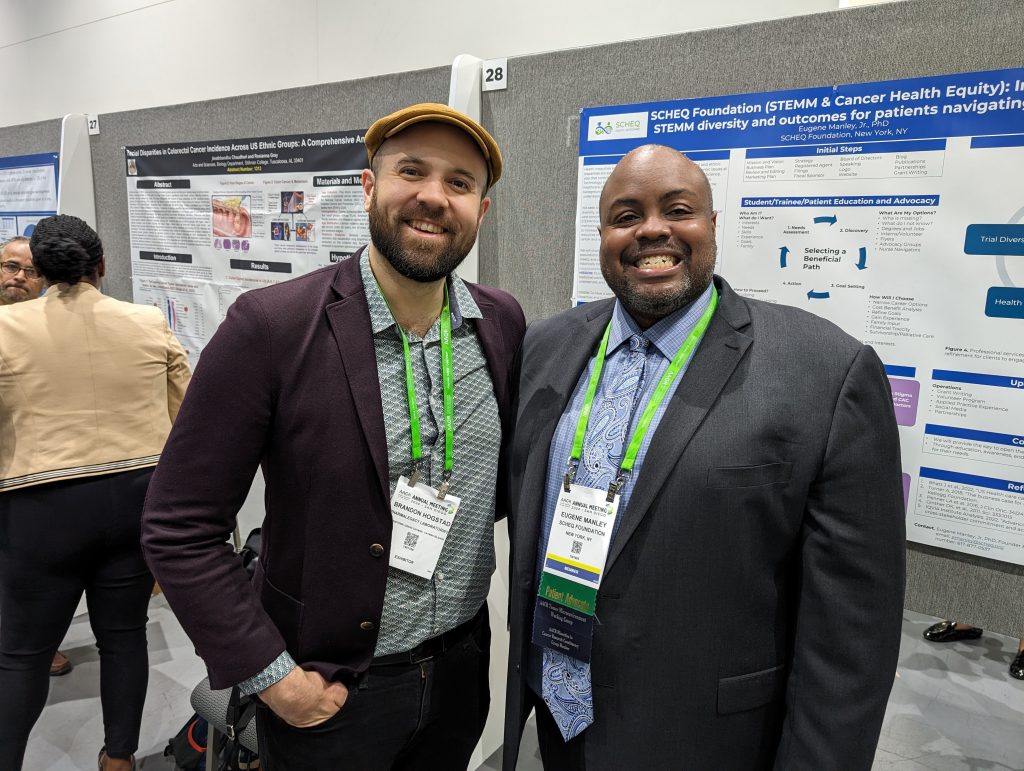
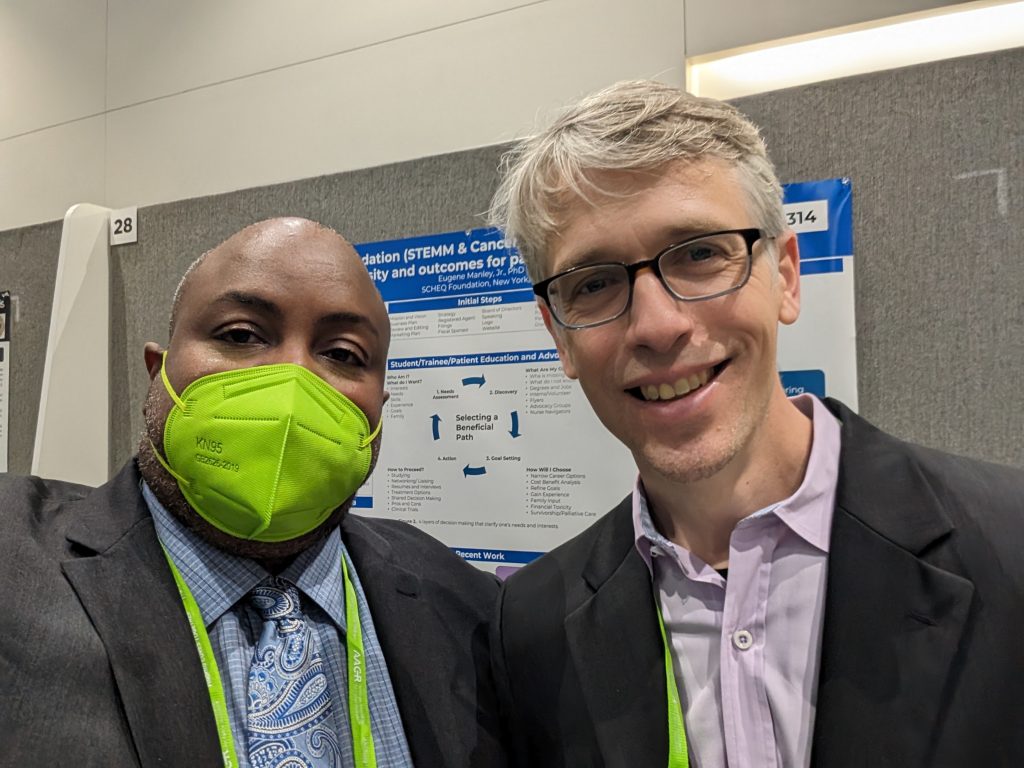
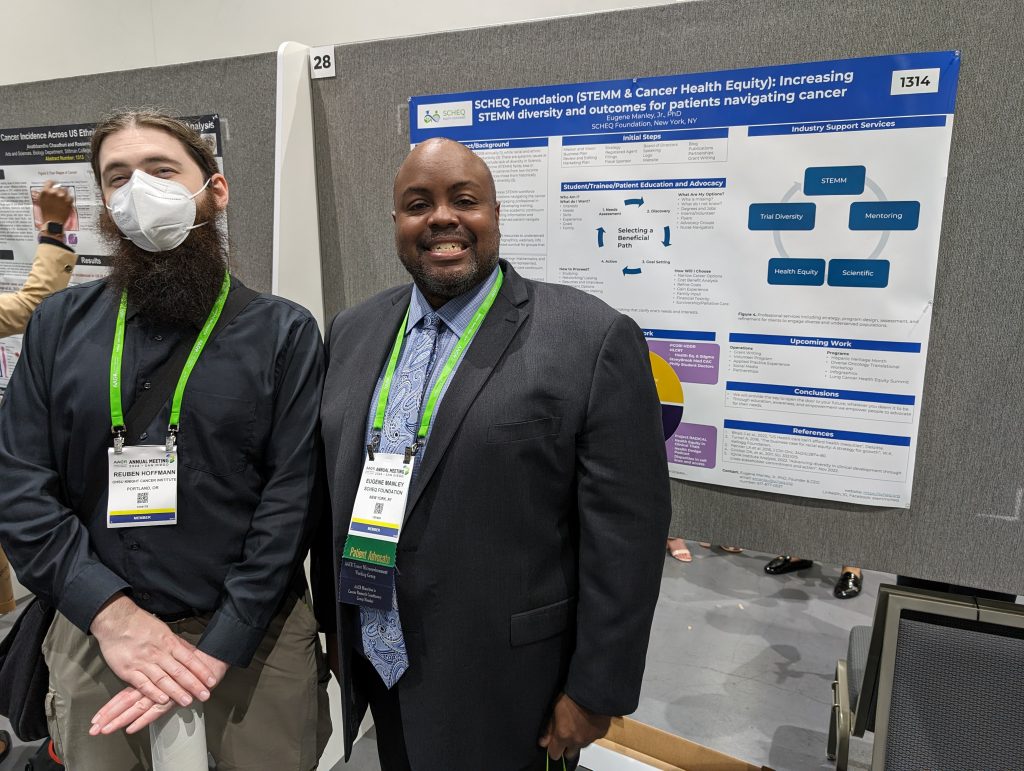
It was a very thorough meeting. I will have to watch many of the technical sessions on replay. You always leave the meeting excited, energized, and exhausted. I am looking forward to next year’s meeting in Chicago.
Eugene Manley, Jr. PhD. Is the Founder and CEO of the SCHEQ Foundation (STEMM & Cancer Health Equity) in New York City. Dr. Manley is a Mechanical Engineer, Biomedical Engineer, and Molecular and Cell Biologist that is dedicated to mentoring, health equity, workforce diversity, training programs, partnerships, and advocating for underserved and marginalized populations.
Interested in learning more about SCHEQ? Please visit our website. If you would like to donate to help us achieve our mission, please click here. If you would like to use another option like stock, wire, or donor advised fund, please contact us. We are a fiscally sponsored organization by the Goodnation Foundation, with EIN number 81-4768488.

